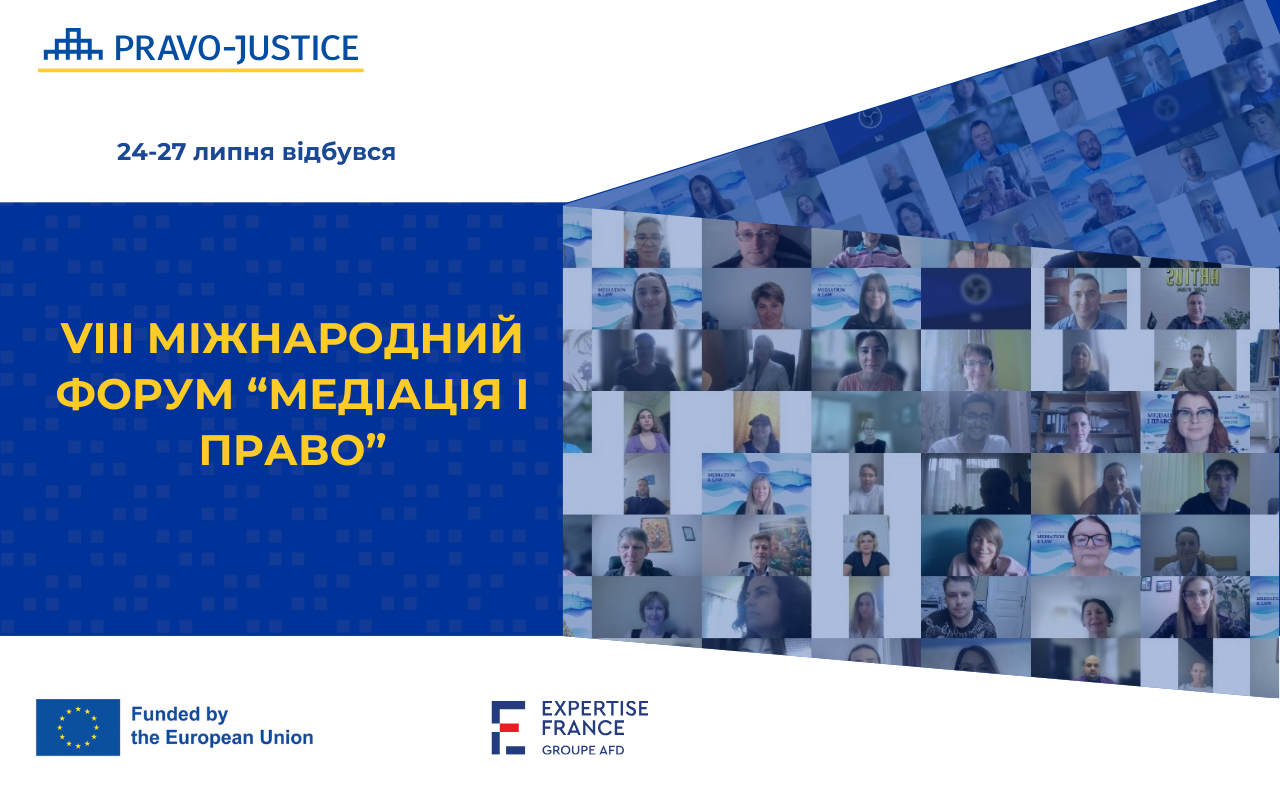With the Support of EU Project Pravo-Justice, the VIII International Forum “Mediation and Law” was Held

More than four hundred participants participated in the VIII International Forum “Mediation and Law” held on 24-27 July. The Ukrainian Academy of Mediation organised the event within the framework of EU Project CONSENT with the support of EU Project Pravo-Justice and USAID Justice for All Activity.
Opening the Forum, Luiza Romanadze, President of the Ukrainian Academy of Mediation, reminded that this year is the 30th anniversary of mediation in Ukraine. On this occasion, the Forum presented an online exhibition – 30 Years of Mediation Development in Ukraine: History and Future. According to Luiza Romanadze, it demonstrates the myriad of developments accomplished over this time.
Manfredas Limantas, Rule of Law Policy Officer at the European Commission, Ukraine Service, stressed that mediation in Ukraine is among the many achievements the country has made since the Revolution of Dignity.
“Reforms continued in wartime are the best proof of Ukraine’s unwavering commitment to high-quality transformations. The EU accession process is perhaps the most powerful vehicle of transformation a country can experience. Therefore, I suggest making use of absolutely everything available within this process, as it will ultimately have a significant impact on citizens, businesses, investors, and authorities in the future,” he said Manfredas Limantas.
Rimantas Simaitis, Associate Professor at the Faculty of Law of Vilnius University, CEPEJ/Council of Europe expert on mediation and/or e-justice, spoke about mediation from the perspective of the Council of Europe. Moreover, he outlined the Council of Europe/CEPEJ instruments for promoting mediation. In particular, they include four recommendations from the Committee of Ministers, three principles of the CEPEJ strategy, and 15 CEPEJ tools for specific elements of developing mediation (Mediation Development Toolkit).
Oksana Tsymbrivska, Team Leader of EU Project Pravo-Justice, focused on the prospects for developing mediation in the context of European integration. She emphasised that the Ukrainian justice system is experiencing many challenges during wartime, one of the biggest being the human resources crisis. Therefore, according to the Team Leader, the judiciary should become one of the main stakeholders in implementing mediation in Ukraine.
“Today, Ukraine lives in two paradigms – the war and the European integration process, which is a significant challenge for us. But at the same time, it is a significant catalyst for changes and transformations in the justice system and in the peaceful settlement of disputes. We are witnessing how mediation is gaining a new dimension, helping to settle conflicts peacefully and thus contributing to shaping a sustainable society in the country and fair access to justice for all citizens,” said EU Project Pravo-Justice Team Leader.
Oksana Tsymbrivska also emphasised the importance of communicating mediation in order to promote it in Ukraine.
‘‘Recognising how important it is to promote the service, EU Project Pravo-Justice produced a comprehensive Communication Strategy on Mediation last year. Today, we are pleased to see that the judiciary is showing leadership in its implementation,” said Oksana Tsymbrivska.
Mykhailo Shumylo, Head of the Secretariat of the High Council of Justice and Doctor of Law, emphasised that mediation is one of the most effective tools for overcoming challenges in the judiciary. He also stressed the importance of alternative dispute resolution in the context of European integration of Ukraine.
‘‘It is a well-known fact that we continue to work amidst the crisis. It primarily concerns human resources matters that cannot be resolved immediately. That is why the judiciary sees great potential in mediation, as alternative dispute resolution is about reducing the workload in courts,” emphasised Mykhailo Shumylo.
Roman Babii, Member of the Parliament of Ukraine and Head of the Subcommittee of the Parliamentary Committee on Legal Policy, also joined the Forum. He spoke about the recommendations adopted during the two-day committee sessions dedicated to mediation. They include creating a separate platform for developing mediation to coordinate all authorities, promoting mediation in enforcement proceedings, collecting statistics on alternative dispute resolution, examining best European practices, applying a single unified style for communicating mediation to promote this service, etc.
“Over more than two years of war, our lives have changed dramatically, impacting mediation. Therefore, it was necessary to examine them and develop a plan for further advancement. The Committee has already produced such draft recommendations and will soon submit them for further approval,” said Roman Babii.
Oleksandr Banchuk, Deputy Minister of Justice, discussed arrangements for bilateral meetings scheduled for September and October 2024. He also noted that the Ministry of Justice is working on mediation in three areas. These include monitoring the implementation of the Law of Ukraine ‘On Mediation’, addressing mediation in the context of European integration, and implementing practical projects implemented in pursuance of the said Law.
During the Forum, participants also heard about the experience and practical advice of experts from different countries. In particular, during the second panel ‘Mediation in Administrative Cases: Challenges, Opportunities and Best Practices’, Virgilijus Valančius, Senior International Expert, Support to EU Integration Process in the Justice Sector Component Lead, gave a presentation. He shared the experience of mediation in Lithuania, where mediation also has a long history.
‘Each EU country has its own legal framework. In civil cases, anyone can be a mediator, but in administrative cases, at least in Lithuania, only judges are entitled to mediate,” said Virgilijus Valančius.
According to him, mediation not only helps to reduce the workload of the judiciary and judges in particular, but also helps to ensure social harmony. That is why the EU focuses on mediation; therefore, mediation will be one of the topics discussed during the bilateral accession negotiations.